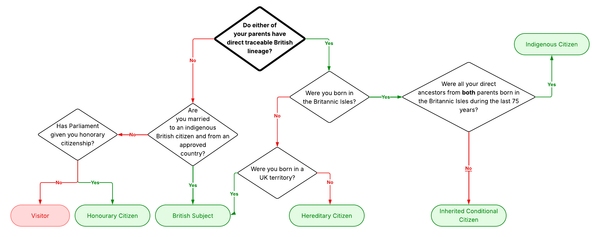The Barbaric Practices Act: Confronting National Evil
As part of the Great Repeal program, the BPA deals with the despicable moral evils our country permits: foeticide, mercy killing, animal cruelty, malignant academia, Islamic dress, porn, cousin marriage, transgenderism, doxxing, reputation destruction, gay surrogacy, paternity fraud, and more.

It's a little studied correlation a nation's morality correlates with its prosperity, both linearly and inversely. When Britain became the first nation to abolish slavery under the Slave Trade Act 1807, what followed was its rise via the Industrial Revolution to the largest empire in human history during the Imperial century of 1815 to 1915.
Historian Harold Perkins notes something else was going on at the same time in his 1969 book "The Origins of Modern English Society."
Between 1780 and 1850 the English ceased to be one of the most aggressive, brutal, rowdy, outspoken, riotous, cruel and bloodthirsty nations in the world and became one of the most inhibited, polite, orderly, tender-minded, prudish and hypocritical. The transformation diminished cruelty to animals, criminals, lunatics, and children (in that order); suppressed many cruel sports and games, such as bull-baiting and cock-fighting, as well as innocent amusements, including many fairs and wakes; rid the penal code of about two hundred capital offences, abolished transportation [of criminals to Australia], and cleaned up the prisons; turned Sunday into a day of prayer for some and mortification for all.
This, in turn, correlates with Oxbridge laureate Joseph Unwin's ideas of "sexual entropy" and 90-year three-generation cycles. His central thesis proposed an invariable relationship whereby societies imposing strict moral and sexual constraints achieved higher levels of cultural development than those permitting moral depravity.
In that spirit, we present the modern sequel to such an era: the Barbaric Practices Act.
Read the draft Barbaric Practices Act. in full here (182 pages):
Like the others, this Act is exceptionally aggressive on a scale the British have not been used to for a few hundred years, but quite enjoy. Among its myriad of entrenched clauses, it:
- Gets rid of "sex education" so school is a place for academic learning;
- Outlaws "sex change" and "gender" pseudoscience from the healthcare system;
- Bans Islamic religious customs;
- Criminalises doxxing, false accusations, deplatforming, and catfishing;
- Finishes up all animal cruelty legislation, like non-stun slaughter and badger-culling;
- Repeals "assisted dying";
- Bans hardcore and extreme pornography, OnlyFans-style sites, and paywalls porn;
- Criminalises bad faith academic behaviour and "dark legend" creation;
- Outlaws cousin marriage and any genetic collision > 5%;
- Criminalises paternity/fertility fraud, and reproductive deception;
- Bans surrogacy entirely;
- Entirely reforms abortion law.
The Barbarism Act: A Guide
The Barbaric Practices Act introduces sweeping legislative changes across twelve distinct areas of law in England and Wales. The legislation creates numerous criminal offences, establishes regulatory frameworks, repeals existing statutory provisions, and fundamentally restructures legal approaches to education, medicine, religious practices, family law, and criminal justice. Comprehensive schedules provide technical specifications and medical criteria supporting the Act's implementation.
The Act comprises 144 sections organised into twelve Parts, supported by twelve detailed Schedules. Each Part addresses a distinct policy area while sharing common features including strict criminal penalties, comprehensive prohibition frameworks, and detailed enforcement mechanisms. The legislation demonstrates extensive parliamentary drafting with precise definitions, detailed procedural requirements, and sophisticated enforcement architecture.
Part I: Child Exposure to Sexual Practices
This Part repeals existing relationships and sex education legislation, replacing it with comprehensive prohibitions on discussing intimate personal matters in educational settings. The provisions establish criminal offences for school employees who discuss sexuality, solicit personal information from pupils, or facilitate activities focused on sexual topics. The legislation creates mandatory reporting obligations and establishes parental primacy over intimate matters affecting children.
Sex education is a communist invention which has inappropriately been injected into education as "health" and "social" learning where the state takes over the parental role. It was designed by György Lukács as a method of violating and subverting the "capitalist" institution of family.
The Part defines intimate personal matters broadly to encompass sexual activity, romantic attraction, personal relationships, and internal perceptions of biological sex. Educational establishments are prohibited from providing instruction, maintaining library materials, or celebrating awareness events relating to sexuality. School employees face criminal liability for violations, with enhanced penalties where conduct is intended to facilitate sexual contact with children.
Part II: Transposition of Sex Characteristics
This Part establishes a comprehensive prohibition framework for medical interventions aimed at altering biological sex characteristics. The legislation repeals the Gender Recognition Act 2004, prohibits NHS funding for transitional procedures, and creates criminal offences for facilitating such interventions, particularly concerning children.
The provisions accurate establish biological sex as scientifically determined by reproductive anatomy organised for gamete production, with chromosomal analysis required where reproductive anatomy cannot determine sex classification.
The legislation prohibits specific medications and surgical procedures when used for "sex change" and "transgender" butchery, while maintaining exceptions for legitimate medical conditions. Criminal penalties extend to importation, distribution, and advocacy activities, with enhanced protection for children through specific offences targeting those who facilitate transitional procedures for minors.
The language is extremely important to note here.
- Sex is not determined by XX or XY. Males produce sperm; females produce eggs. This cannot be changed. Hence the term "attempted."
- You cannot "change" or "transform" anything. You can only transpose one sex's characteristics onto the other. This butchery was invented by Magnus Hirschfield, whose employees later worked in Nazi concentration camps.
- "Gender" is social science nonsense concocted by crank psychologists Madison Bentley and John Money after WWII. It refers to tertiary (3rd level) sex characteristics, or typical preferences exhibited by males and females.
Part III: Alien Religious Customs
This Part prohibits specific Islamic religious and cultural practices including parallel Sharia legal systems, non-medical male circumcision, Islamic dress coverings, and polygamous marriages. The legislation creates criminal offences for operating religious tribunals, performing genital modification on minors, wearing prescribed religious garments, and recognising polygamous relationships.
There is no excuse for Sharia in Britain, and if one wants take a knife to one's own child's genitals, they can do it overseas. The liberal argument for "not prescribing what people can wear" is an utter nonsense: we mandate through law what people must wear all the time. One may not go nude in public (enforcement of clothing); school uniforms; face masks; the list is endless.
The provisions establish comprehensive prohibition of parallel legal systems based on Islamic jurisprudence, criminalising participation in Sharia councils or tribunals. The legislation prohibits specific dress coverings including hijab, niqab, and burqa in all locations, with police powers to require removal and enter premises to investigate domestic coercion. Non-medical circumcision of males under sixteen years becomes a criminal offence, with no exception for religious practices.
Part IV: Reputational Destruction
This Part creates new criminal offences addressing various forms of reputational harm including false sexual allegations, electronic deception, malicious disclosure of personal information, and strategic litigation. The provisions establish strict liability for certain conduct while providing defences for legitimate public interest activities.
The legislation criminalises false accusations of sexual offences where the accuser has personal knowledge of the accused, with enhanced penalties for persistent false allegations. Electronic deception for personal gain becomes a criminal offence, including catfishing and fraudulent online personas. The Part addresses doxxing through prohibiting malicious disclosure of contact information and creates specific offences for public officials who inappropriately characterise children in sexual terms.
Part V: Animal Cruelty
This Part establishes comprehensive prohibitions on intensive farming practices and non-stun slaughter methods. The legislation mandates specific space requirements for agricultural animals, prohibits confinement systems, and eliminates religious exemptions for slaughter practices.
The provisions prohibit battery cages for laying hens, farrowing crates for pigs, individual confinement of calves, and battery systems for rabbits. Non-stun slaughter is prohibited universally with no exceptions for religious practices, overriding existing exemptions under previous legislation. The Part includes prohibitions on badger culling, surgical procedures without anaesthesia, and live baiting in falconry, while mandating transparency in animal research.
Part VI: Human Mercy Killing
This Part prohibits all forms of assisted dying and euthanasia while providing specific defences for legitimate medical practice. The legislation repeals the Terminally Ill Adults Act 2025 and establishes criminal offences for participation in mercy killing activities.
There is no such thing as a "dignified death." This nonsense is Boomers awarding themselves yet more luxuries after they ruined everything. Canada's insanity with "Medical Assistance in Dying" makes it quite clear how evil this idea is.
The provisions define human mercy killing broadly to include assistance with suicide, direct administration of lethal substances, and procedures designed to accelerate death. Medical practitioners receive defences for legitimate palliative care where the primary intention is symptom relief rather than causing death. The legislation establishes duties to preserve life while providing enhanced protection for vulnerable persons and mandating development of palliative care services.
Part VII: Hardcore Pornography
This Part creates comprehensive criminal prohibitions on production and distribution of hardcore and extreme pornography while establishing regulatory requirements for online platforms. The legislation treats pornographic performance as prostitution and mandates paywalls for accessing sexual material.
Porn is definable, and it is obscenity. It is not free speech. We all know what porn is and how poisonous it is to marriage and young men. Page 3 is not Pornhub, and sex scenes in dramas are not porn. The idea anyone would confuse them is absurd.
This part also deals with the pernicious nonsense of the Online Safety Act, and simply demands porn sites paywall themselves – however they decide to. It creates a vicious dragnet of bureaucracy designed to make it so burdensome to have anything to do with porn, it's expensive and pointless – for example, taxes on bandwidth and stream encryption.
The provisions establish detailed classification criteria for sexual material, distinguishing between educational, artistic, soft pornographic, hardcore, and extreme categories. Production and distribution of hardcore and extreme pornography become criminal offences with substantial penalties. The legislation requires digital rights management for protected content and establishes strict liability for platforms allowing child access to pornographic material.
Part VIII: Malignant Scholarship
This Part addresses academic fraud through creating civil and criminal liability for fraudulent scholarship, particularly concerning historical and cultural misrepresentation. The legislation establishes enforcement mechanisms for systematic academic misconduct while providing defences for legitimate scholarly inquiry.
These provisions are explicitly designed to circumvent free speech considerations by outlawing academic misconduct as fraud. Fraud is not legitimate free speech; nor is slander or defamation. Nationalised defamation, such as accusing Britain of promoting the slave trade when she ended it, while in an elevated position of academic authority, must come to an end.
A significant number of terrorists in the 1960s were warmly embraced by universities as professors.
The provisions define academic fraud as deliberate misrepresentation of partisan advocacy as objective research, with specific focus on historical misrepresentation concerning the United Kingdom. Fraudulent use of public funding for partisan research becomes subject to civil penalties and funding disqualification. The Part provides comprehensive enforcement mechanisms while preserving defences for genuine scholarly debate and public interest disclosure.
Part IX: Consanguinity
This Part prohibits marriages and civil partnerships between first cousins and other close relatives by amending existing marriage and civil partnership legislation. The legislation establishes criminal offences for entering prohibited relationships and requires genetic testing where relationships are uncertain.
The provisions establish a scientific coefficient of relationship threshold of five percent, specifically prohibiting marriages between first cousins, half-relatives, and cross-generational step-relationships. The legislation amends the Marriage Act 1949 and Civil Partnership Act 2004 to incorporate these prohibitions while creating new criminal offences for violating the restrictions.
Part X: Imposed Paternity
This Part creates criminal offences addressing reproductive coercion, contraceptive sabotage, and paternity fraud. The legislation establishes comprehensive liability for unauthorised use of reproductive material and deceptive practices concerning conception and paternity.
These offences are staggeringly widespread but endlessly dismissed by political groups who see them as "competitive" to their own partisan interests in an imaginary "battle of the sexes." Two percent of British fathers, for example, unknowingly raise a child who is the biological child of another man.
The provisions criminalise retention and use of reproductive material without consent, intentional contraceptive sabotage, and false representations regarding reproductive status. Paternity fraud becomes a criminal offence with substantial penalties, while fertility fraud by medical professionals receives enhanced sanctions. The legislation establishes extended limitation periods and professional consequences for healthcare providers involved in reproductive deception.
Part XI: Adoption and Surrogacy
This Part prohibits all surrogacy arrangements and restricts adoption to married heterosexual couples. The legislation repeals existing surrogacy legislation, criminalises participation in surrogacy arrangements, and nullifies existing parental orders from surrogacy.
There is no reason whatsoever – including infertility – to rip a child from his or her mother's arms and give them to someone else. There is no justification for "renting a womb." Nature is cruel. That does not mean we are permitted to be cruel in turn.
The provisions establish absolute prohibition of surrogacy with criminal penalties for all participants including intended parents, surrogate mothers, and facilitating professionals. Biological mothers retain exclusive parental responsibility for children born through surrogacy arrangements. The legislation restricts adoption to married couples consisting of one man and one woman, repealing provisions allowing same-sex adoption.
Part XII: Foeticide and Termination of Pregnancy
This Part establishes comprehensive regulation of pregnancy termination while creating new criminal offences for unlawful foetal killing. The legislation permits termination only in strictly defined circumstances while establishing extensive procedural safeguards and reporting requirements.
It is nothing short of a complete overhaul of the Abortion Act 1967 and all the disaster it has wrought. Foeticide is a staggering evil which has almost no defence.
The Act recognises the extremely narrow circumstances where termination may be required (and defines them clearly), but strictly prohibits the casual pursuit of killing one's offspring for convenience. 10 million children have been murdered since 1967 at a rate of 200,000 a year.
The provisions define human persons as possessing legal rights from fertilisation, creating criminal liability for unlawful killing before birth. Lawful termination is permitted only where continuation poses grave and imminent risk of maternal death, where foetal conditions are incompatible with survival, or where pregnancy resulted from rape or incest with formal police involvement.
The legislation establishes mandatory waiting periods, counselling requirements, enhanced medical practitioner qualifications, and comprehensive reporting obligations to the Chief Medical Officer.
It is the most sophisticated abortion law in the world, bar none.
Enforcement Architecture
The Act establishes sophisticated enforcement mechanisms including criminal penalties ranging from fines to life imprisonment, civil liability frameworks, professional sanctions, and asset forfeiture powers. Multiple Parts create automatic reporting obligations to professional regulatory bodies and establish enhanced investigative powers for enforcement agencies.
The legislation provides for parliamentary oversight through mandatory reviews, judicial review procedures, and detailed annual reporting requirements. Implementation planning includes comprehensive transitional arrangements, funding obligations, and coordination requirements across government departments and professional bodies.





